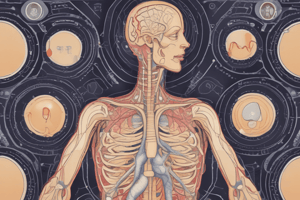Podcast
Questions and Answers
Exocrine glands secrete hormones directly into the blood or tissue fluid.
Exocrine glands secrete hormones directly into the blood or tissue fluid.
False (B)
The primary function of the endocrine system is to maintain homeostasis in the body.
The primary function of the endocrine system is to maintain homeostasis in the body.
True (A)
Hormones can only have local effects on nearby cells and cannot influence distant cells.
Hormones can only have local effects on nearby cells and cannot influence distant cells.
False (B)
Target cells are those that have receptors for a particular hormone on their surfaces.
Target cells are those that have receptors for a particular hormone on their surfaces.
Gigantism and dwarfism are examples of conditions caused by abnormalities in hormone levels.
Gigantism and dwarfism are examples of conditions caused by abnormalities in hormone levels.
The thymus gland is located in the neck region of the body.
The thymus gland is located in the neck region of the body.
The pancreas serves solely as an endocrine gland.
The pancreas serves solely as an endocrine gland.
The endocrine system does not interact with the nervous system.
The endocrine system does not interact with the nervous system.
Hormones act more quickly than signals sent by the nervous system.
Hormones act more quickly than signals sent by the nervous system.
Steroid hormones are synthesized from cholesterol.
Steroid hormones are synthesized from cholesterol.
Nonsteroidal hormones can easily cross the cell membrane due to their lipid solubility.
Nonsteroidal hormones can easily cross the cell membrane due to their lipid solubility.
The response to nonsteroidal hormones is typically longer lasting compared to steroid hormones.
The response to nonsteroidal hormones is typically longer lasting compared to steroid hormones.
Glycoproteins are hormones made of a protein attached to a carbohydrate.
Glycoproteins are hormones made of a protein attached to a carbohydrate.
The degree of cellular response to a steroid hormone is unrelated to the number of hormone-receptor complexes formed.
The degree of cellular response to a steroid hormone is unrelated to the number of hormone-receptor complexes formed.
Peptide hormones are composed of long chains of amino acids.
Peptide hormones are composed of long chains of amino acids.
Steroid hormones can activate certain genes once they enter the nucleus of a target cell.
Steroid hormones can activate certain genes once they enter the nucleus of a target cell.
Flashcards
Endocrine System
Endocrine System
Cells, tissues, and organs that release hormones into the body fluids to regulate various functions.
Endocrine Glands
Endocrine Glands
Glands that release hormones directly into the bloodstream.
Exocrine Glands
Exocrine Glands
Glands that secrete substances into ducts leading to internal & external surfaces.
Hormone Function
Hormone Function
Signup and view all the flashcards
Hormone Action
Hormone Action
Signup and view all the flashcards
Target Cells
Target Cells
Signup and view all the flashcards
Hormones
Hormones
Signup and view all the flashcards
Endocrine-Nervous System Interaction
Endocrine-Nervous System Interaction
Signup and view all the flashcards
Hormone Speed
Hormone Speed
Signup and view all the flashcards
Hormone Potency
Hormone Potency
Signup and view all the flashcards
Steroid Hormone Action
Steroid Hormone Action
Signup and view all the flashcards
Nonsteroidal Hormone Action
Nonsteroidal Hormone Action
Signup and view all the flashcards
Steroid Hormone Structure
Steroid Hormone Structure
Signup and view all the flashcards
Hormone Mechanism: Steroid vs. Non-steroid
Hormone Mechanism: Steroid vs. Non-steroid
Signup and view all the flashcards
What are steroid hormones?
What are steroid hormones?
Signup and view all the flashcards
What are non-steroid hormones?
What are non-steroid hormones?
Signup and view all the flashcards
Study Notes
Endocrine System Overview
- The endocrine system is composed of cells, tissues, and organs that secrete hormones into bodily fluids (e.g., blood).
- Endocrine glands secrete hormones directly into the blood or tissue fluid.
- Exocrine glands secrete substances into ducts that open onto internal or external surfaces.
- The endocrine system regulates metabolism, growth, development, water balance, electrolytes, reproduction, and the response to stress.
- Hormone imbalances can lead to significant health problems (e.g., dwarfism, gigantism, infertility).
- The endocrine system works with the nervous system to coordinate and control body functions.
Endocrine Glands
- Brain: Hypothalamus, Pituitary gland
- Neck: Pineal gland, Thyroid gland, Parathyroid gland
- Above the Heart: Thymus
- Abdomen: Adrenal gland, Kidney, Pancreas
- Pelvis: Ovary, Testis
Hormones and Their Actions
- Hormones are substances secreted by cells that affect other cells.
- Hormones can act locally or throughout the body depending on their mode of transport and effect.
- Target cells have specific receptors for certain hormones.
- Hormone effects are longer-lasting than immediate nervous system responses.
- Hormones can produce significant changes in target cells, even at very low concentrations.
- Hormones can be steroids, amines, peptides, proteins, or glycoproteins.
Steroid Hormones
- Steroids are derived from cholesterol.
- Steroid hormones (e.g., sex hormones like estrogen and testosterone, hormones from the adrenal cortex like aldosterone and cortisol) easily cross cell membranes.
- Steroid hormones directly affect gene activity by binding to receptors in the target cell nucleus.
- The amount of hormone-receptor complex formed dictates the degree of cellular response.
Nonsteroidal Hormones
- Nonsteroidal hormones (e.g., amines, peptides, proteins, and glycoproteins) cannot readily pass through cell membranes.
- Nonsteroidal hormones bind to receptors on the target cell membrane.
- The hormone-receptor interaction triggers a signaling pathway within the cell, often involving "second messengers" (e.g., cAMP, cGMP, calcium, polyphosphoinositides).
- These events lead to changes in the target cell's activities.
Studying That Suits You
Use AI to generate personalized quizzes and flashcards to suit your learning preferences.




